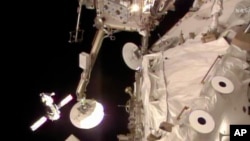Differences between the West and Russia over the situation in Eastern Ukraine are beginning to affect scientific cooperation between Washington and Moscow. Russia is threatening to close U.S. satellite navigation monitoring stations in Russia.
The threat to close stations that monitor signals from the U.S. satellite-based Global Positioning System followed other warnings about ending scientific cooperation.
Deputy Prime Minister Dmitry Rogozin also announced Moscow will ban the United States from using Russian rocket engines to launch military satellites and cut Russian participation on the International Space Station by four years.
There are 11 GPS tracking stations in Russia that may be forced to suspend operations on June 1. According to University of New Brunswick Professor Richard B. Langley, the stations are used for extracting scientific data from the satellite signals.
“If they are shut down, they will not affect the day-to-day operations of GPS and the kind of positioning and navigation that we do with our car navigation units and so forth," he said. "But it will have a significant impact on the scientific studies that are being done using GPS signals.”
The ground part of America's GPS system consists of a master control station and several dedicated monitor stations that keep the satellites in proper orbit and correct timing errors. None of them are located on Russian territory.
Russia's satellite navigation system, GLONASS, also has several monitor stations outside Russia, and Moscow would like to build a few on U.S. territory. Washington is refusing permission and Rogozin says if agreement on that is not reached by September 1, operation of U.S. GPS tracking stations in Russia will end permanently.
Langley, who was interviewed by Victoria Kupchinetsky of VOA’s Russian Service, stressed neither country's stations can be used for anything other than monitoring satellites.
“I can not envisage how they could be used for spying," he said. "We know the exact location of them. In many cases they would be at scientific institutions, typically the data is freely available.”
Langley says shutting down the tracking stations may also hurt Russian science because its scientists also benefit from data extracted from GPS and GLONASS signals.
The threat to close stations that monitor signals from the U.S. satellite-based Global Positioning System followed other warnings about ending scientific cooperation.
Deputy Prime Minister Dmitry Rogozin also announced Moscow will ban the United States from using Russian rocket engines to launch military satellites and cut Russian participation on the International Space Station by four years.
There are 11 GPS tracking stations in Russia that may be forced to suspend operations on June 1. According to University of New Brunswick Professor Richard B. Langley, the stations are used for extracting scientific data from the satellite signals.
“If they are shut down, they will not affect the day-to-day operations of GPS and the kind of positioning and navigation that we do with our car navigation units and so forth," he said. "But it will have a significant impact on the scientific studies that are being done using GPS signals.”
The ground part of America's GPS system consists of a master control station and several dedicated monitor stations that keep the satellites in proper orbit and correct timing errors. None of them are located on Russian territory.
Russia's satellite navigation system, GLONASS, also has several monitor stations outside Russia, and Moscow would like to build a few on U.S. territory. Washington is refusing permission and Rogozin says if agreement on that is not reached by September 1, operation of U.S. GPS tracking stations in Russia will end permanently.
Langley, who was interviewed by Victoria Kupchinetsky of VOA’s Russian Service, stressed neither country's stations can be used for anything other than monitoring satellites.
“I can not envisage how they could be used for spying," he said. "We know the exact location of them. In many cases they would be at scientific institutions, typically the data is freely available.”
Langley says shutting down the tracking stations may also hurt Russian science because its scientists also benefit from data extracted from GPS and GLONASS signals.




